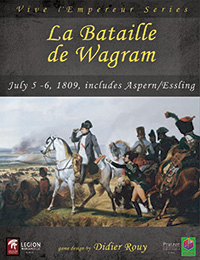 |
Vive l'Empereur
Click here to learn more about the full series.
| Volumes I - XI are: |
| I |
Auerstaedt 1806 |
| II |
Hanau 1813 |
|
by Socomer Editions |
| III |
Eckmuhl 1809 |
| IV |
Friedland 1807 |
| V |
Austerlitz 1805 |
|
by Azure Wish Editions |
| VI |
Leipzig 1813 |
| VII |
Le Retour
de l’Empereur |
| |
by Pratzen Editions |
| VIII |
Quatre Batailles
en Espangne |
|
by Legion Wargames |
| IX |
Trois Batailles
en Allemagne |
|
by Legion Wargames |
| X |
La Bataille
de Hanau |
|
by Legion Wargames |
| XI |
La Bataille
de Wagram |
|
by Legion Wargames |
|
|
Vive l'Empereur Series -Vol. XI
La Bataille de Wagram
July 5-6, 1809 - includes Aspern/Essling
series/game design by Didier Rouy |
MSRP $120.00
Pre-Order Price
$90.00
+ shipping |
Vive l'Empereur Series is a simulation of the battles fought during the Napoleonic Era in Europe, between 1805 and 1815. The scale is the regiment, a good compromise between the brigade level (with no formations) and the detailed battalions. The scale is 250 m/hex and a turn is 30 minutes.
The battle of Wagram, July 5 and 6, 1809, is the second biggest battle of the Napoleonic era after Leipzig. It is the nadir of the Danube Campaign, starting in Bavaria in April and ending in July across the Danube. Around 180.000 French troops face 135.000 Austrians lead by the skilled Archduke Charles. After a bloody stalemate a month and a half before at Aspern-Essling (also included in the box as an experimental scenario), Wagram is a huge battle, a clear but not decisive French victory. Another battle, at Znaim a few days later, will be needed to finally push the Austrians to sue for peace.
The game includes 17 scenarios, spread over historical small pieces of the huge battle, a few scenarios from the opening moves the night and day before, and several what-ifs scenarios. The game includes Austrians troops from Archduke Johann and Prince of Reuss that could have been there that day and would push the final Austrian army to 165.000 men.
Other scenarios cover well known episodes like MacDonald’s attack, Davout's maneuver, the Austrian move to cut the French army by taking the bridge on the Danube, and Masséna’s stout defense, among others.
History shows the advantage of an interior lines deployment, keeping a lot of reserves, and gambling on losing the left flank to prioritize the right wing and punch a hole in the center of the enemy army. The archduke, too extended and without a real reserve, will fight there his last campaign. Things could have turned differently !
|